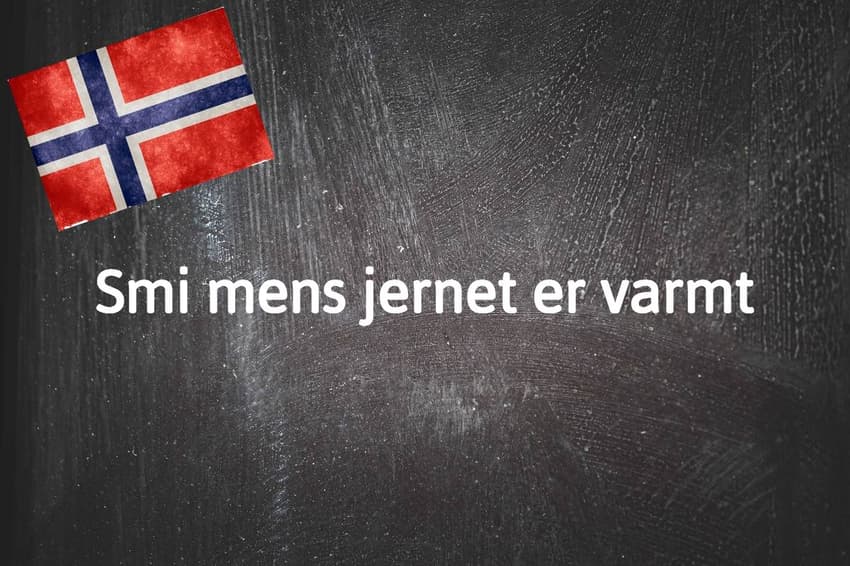Norwegian expression of the day: Smi mens jernet er varmt

Sometimes you must act quickly to make the most of something at an ideal moment. Luckily, there’s a Norwegian phrase for such an event.
What does Smi mens jernet er varmt mean?
The expression means to ‘forge while the iron is hot’, which essentially is the same as the English language equivalent of striking while the iron is hot.
Like in English, it means making the most of an opportunistic or ideal moment. This is because striking red (or hot) iron is the best way to shape it into your design. Therefore the saying means to act quickly whilst you have the opportunity.
The reason why we’ve selected this expression is that while Norwegian has plenty of unique expressions which don’t exist in English like, å være midt i smørøyet (to be in the middle of the butter eye) and skjegget I postkassa (beard in the mailbox), it shares many with other languages.
Smi mens jernet er varmt is just one example. Other examples include bedre sent enn aldri (better late than never), ta med en klype salt (take with a pinch of salt) and øving gjør mester (practice makes perfect).
Other sayings are essentially the same but tweaked slightly. For example, man skal ikke skue hunden på hårene (you shouldn’t judge a dog by its hair) is an equivalent of you shouldn’t judge a book by its cover. Furthermore, eplet faller ikke langt fra stamen (the apple doesn’t fall far from the trunk) and storm i et vannglass (storm in a water glass) are incredibly similar to their English equivalents.
One possible explanation for shared phrases across different languages is due to a shared ancestral tongue. For example, some researchers believe English belongs to or at least traces its origins from the Northern Germanic language group. This is the same group of languages that Norwegian, Danish, Swedish, Icelandic and Faroese belong to.
However, this theory isn’t endorsed by all researchers. Many still believe English is derived from Old English, a West Germanic language.
Another explanation would be the shared historical links between the UK and Norway. A heavy Scandinavian presence in the UK for centuries could have led to a mixing of Old Norse and Old English, resulting in shared idioms and phrases.
Comments
See Also
What does Smi mens jernet er varmt mean?
The expression means to ‘forge while the iron is hot’, which essentially is the same as the English language equivalent of striking while the iron is hot.
Like in English, it means making the most of an opportunistic or ideal moment. This is because striking red (or hot) iron is the best way to shape it into your design. Therefore the saying means to act quickly whilst you have the opportunity.
The reason why we’ve selected this expression is that while Norwegian has plenty of unique expressions which don’t exist in English like, å være midt i smørøyet (to be in the middle of the butter eye) and skjegget I postkassa (beard in the mailbox), it shares many with other languages.
Smi mens jernet er varmt is just one example. Other examples include bedre sent enn aldri (better late than never), ta med en klype salt (take with a pinch of salt) and øving gjør mester (practice makes perfect).
Other sayings are essentially the same but tweaked slightly. For example, man skal ikke skue hunden på hårene (you shouldn’t judge a dog by its hair) is an equivalent of you shouldn’t judge a book by its cover. Furthermore, eplet faller ikke langt fra stamen (the apple doesn’t fall far from the trunk) and storm i et vannglass (storm in a water glass) are incredibly similar to their English equivalents.
One possible explanation for shared phrases across different languages is due to a shared ancestral tongue. For example, some researchers believe English belongs to or at least traces its origins from the Northern Germanic language group. This is the same group of languages that Norwegian, Danish, Swedish, Icelandic and Faroese belong to.
However, this theory isn’t endorsed by all researchers. Many still believe English is derived from Old English, a West Germanic language.
Another explanation would be the shared historical links between the UK and Norway. A heavy Scandinavian presence in the UK for centuries could have led to a mixing of Old Norse and Old English, resulting in shared idioms and phrases.
Join the conversation in our comments section below. Share your own views and experience and if you have a question or suggestion for our journalists then email us at [email protected].
Please keep comments civil, constructive and on topic – and make sure to read our terms of use before getting involved.
Please log in here to leave a comment.